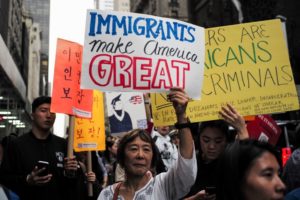Ending DACA Would Be A Giant Blow To Our Economic Future

Rep. Raja Krishnamoorthi
Contributor Representative, U.S. Congress (IL-08)
With President Trump’s order to end the Deferred Action for Childhood Arrivals (DACA) program, our economy just received an unnecessary and self-inflicted wound. DACA protects the education and employment status of undocumented immigrants brought to this country as children. New DACA applications are no longer being processed, and in less than 5 months they will begin to expire without the possibility of renewal. Congress now has until March 6, 2018 to find a way to prevent the deportation of hundreds of thousands of these U.S. residents.
President Trump justifies his actions, in part, as promoting jobs for American citizens. In truth, ending DACA will cost us tens of thousands of jobs and billions of dollars in economic activity. Poll after poll shows that a large majority of American voters want to see DACA protections continue.
No doubt, most Americans embrace DACA on moral grounds. They don’t believe that those who were brought to the U.S. as children, and have known no other home, should be arrested and deported for circumstances beyond their control. Beyond the serious moral implications, the economic cost of such a move demands consideration. After all, 97 percent of those protected under DACA are either employed or enrolled in school.
The Center for American Progress estimates that ending DACA would remove 685,000 workers from our nation’s economy. This would result in a loss of more than $460 billion from our Gross Domestic Product – the equivalent of a major natural disaster. And the damage would spread throughout the economy, from our nation’s largest companies to some of its newest job-creators. The CAP study found that 72 percent of Fortune 500 companies employ DACA workers.
Illinois is home to a disproportionate share of Dreamers and would suffer a significant economic blow should they be compelled to leave. According to government figures, there are 42,376 Illinois residents with DACA status and an estimated 36,867 are holding jobs. Many Dreamers are working while simultaneously attending school. The estimated loss to Illinois’ Gross Domestic Product from removing its DACA workers is $2.3 billion – a blow that our fiscally challenged state would be hard-pressed to absorb.
Perhaps unsurprisingly, these young Dreamers are entrepreneurial in spirit — much like previous generations of immigrant Americans. The CAP study reports that five percent of them started their own businesses after receiving DACA certification. For Dreamers 25 years and older, this jumps to eight percent – almost three times the number of such entrepreneurs among the U.S. population as a whole.
There’s another important reason not to send the Dreamers packing: they are essential to preserving the social insurance programs on which older Americans rely. More and more Baby Boomers are reaching retirement age, with relatively fewer and fewer active workers paying into Social Security and Medicare. Tossing nearly a million productive, taxpaying Dreamers out of a job will remove billions of dollars in contributions to those essential retirement programs.
Each Dreamer in our country is more than a mere statistic; he or she is a proud American in everything but official documentation. Here is an email I received from a Dreamer in my congressional district, representing thousands of others across Chicago and Illinois. I’ve changed his name to protect his status.
“Hello Congressman Krishnamoorthi, my name is Roberto and I have lived in your district for the past 17 years. Considering that I am 23 years old, and have lived in the U.S. since I was 3, I essentially consider myself an American…I am currently in my final semester of college at UIC and will graduate with a double-major in Biology and Psychology. I work at a local Senior Living Center as well. On the weekends I help my father and his small business…I pay taxes, follow the law, and constantly try to further my education for my future.”
Do we really want to force young people like Roberto out of our country, losing the energy, knowledge and ambition they provide for our region and our country? As someone who was brought to the U.S. as an infant by immigrant parents in search of a better life, I hope Congress will find a solution that keeps these Dreamers a part of our nation – for their benefit, and for ours.
Photo Credit: Huffington Post
Original Article
